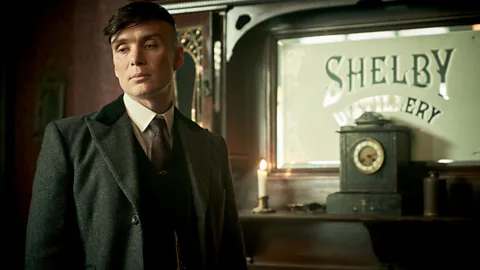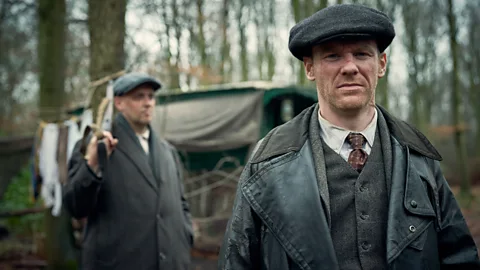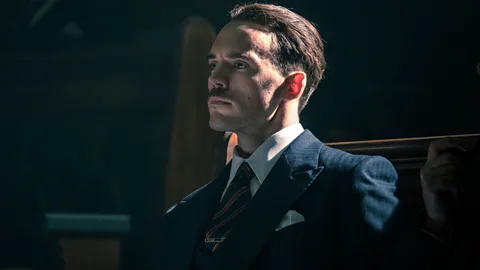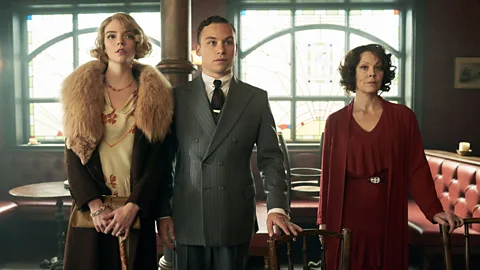Is Peaky Blinders the most violent show on TV?
 BBC
BBCAs the super-stylish British gangster drama returns for a fifth series, its goriness is set to divide opinion more than ever, writes Sarah Hughes.
Stylish suits, sharp words and violent misdeeds. It can only mean one thing – Birmingham-set crime drama Peaky Blinders is back after an absence of almost two years.
The fifth series of the Bafta award-winning show premiered in the UK on BBC One this week and will arrive for international audiences on Netflix this October – and, on the basis of the first two episodes, fans can rest assured that razor-cheekboned gang boss Tommy Shelby’s (Cillian Murphy) decision at the end of the last series to move sideways into politics hasn’t entirely smoothed the rough edges away.
More like this
Nor has it eradicated this most hyperactive of shows’ tendency to throw everything and the kitchen sink into its series openers. When we last saw the Shelby clan they were recovering from a particularly bruising encounter with US gangster Luca Changretta (Adrien Brody) with Tommy having decided that the future lay in swapping one murky world for another and becoming a Labour MP. The series even ended on a relatively hopeful note with the extended Shelby clan celebrating Tommy’s election victory.

This new series kicks the action forward a couple of years to 1929 while making it clear that the move into politics may not be paying the dividends it once promised to. For although the ever-scheming Tommy clearly has a knack for populist politics, history is not currently on the side of businessmen, legitimate or otherwise, and the Wall Street crash soon forces the clan back into more devious ways of making money.
Older brother Arthur (Paul Anderson) tries to adapt to his new role as chairman of the board and a rejuvenated Aunt Polly (Helen McCrory) schemes and dreams with sharp-tongued sister Ada (Sophie Rundle). Meanwhile Tommy, beset by enemies and increasingly obsessed by intimations of betrayal, faces his very own winter of discontent.
“When people think you’re going to fall, they start behaving in a different way. They start to circle,” he says gloomily, and no wonder he feels that way given the proliferation of enemies he and his family face. Now there are Glaswegian gangs jostling with politicians and police officers to try and bring the Shelbys down.
New villains
And if those gathering sharks can smell blood it’s because there’s no shortage of it. Five seasons in, Peaky Blinders remains a drama drenched in guts and gore. In these two episodes alone, there is an assassination, an ambush, a bloody beating and a gruesome crucifixion.
Amid the bloodshed, time is also taken to introduce the series’ new antagonists, Glaswegian razor gang, the Billy Boys, who have their eyes on the Shelby racetrack operation and whose ferocious leader Jimmy (Brian Gleeson) is apparently prepared to do anything to secure them. Tom Hardy’s devious Alfie Solomons, who engineered his death at the hands of his great frenemy Tommy at the end of the last season, bequeathing his killer his dog in the process, will be much missed, but the early signs are that Gleeson’s unhinged Jimmy may prove a worthy foe.
That said, the worst villains on this show are often the ones who seem less obviously threatening – while the Billy Boys are intent on wreaking destruction on the illegal side of the Shelby empire, Labour MP and future fascist Oswald Mosley (a suavely malevolent Sam Claflin), the series’ other new villain, lurks in the Whitehall wings ready to drop sweet poison into the ears of anyone who will listen. His words may yet prove more insidious then Jimmy’s violent deeds. Meanwhile the return from the US of Polly’s ambitious young son Michael (Finn Cole), with both a glamorous companion (Anya Taylor-Joy) and possible designs on becoming top dog in the family, presents a dangerous internal threat to Tommy’s fiercely guarded kingdom.

Small wonder then that the writing, always heavily stylised, seems increasingly Shakespearian: “When I do sleep I dream – and in my dreams someone wants my crown. I think it might be Michael,” notes a paranoid Tommy, propped up on morphine and beset by visions of his dead wife Grace, towards the end of the second episode. Any intimations of Richard III are clearly intentional, although the ghost of Michael Corleone smirks knowingly in the background too.
Such comparisons might strike some as over-the-top but then Peaky Blinders has always been a show that divides viewers. For every fan who thrills to its flamboyant melodrama there is a critic who sees it as all style and no substance, a blood-splattered sub-Guy Ritchie period piece in hock to its own shallow image.
Insightful or exploitative?
Such criticisms are unfair to a series that is far more thoughtful than a cursory watch might suggest. Creator Steven Knight has always been as interested in the price violence might extract from a person’s soul as in the violence itself and there have been moments, most notably in the exceptional second series, when the brutal reality of the Shelby way of life has been hauntingly hammered home.
Yet it is also true that there is a growing disconnect between the way the show is written and the way it is seen by some of its fanbase. Emily Nussbaum, the television critic for the New Yorker, famously wrote about the notion of the ‘bad fan’ citing The Sopranos and Breaking Bad as examples of series where a ionate fanbase responded to them and their characters in ways their writers clearly did not intend. In both those shows the issues centred around violence – where the creators were clear that neither Tony Soprano nor Walter White were men whose deeds should be celebrated, fans begged to differ, rejecting an in-built ambiguity to instead embrace even the worst of crimes.
As Peaky Blinders enters its fifth series so it continues to struggle with similar issues. While Knight is keen to examine how a generation defined by their experiences on the battlefield might bring those experiences to civilian life and what the consequences of that might be, fervent social media debates suggest that some fans simply want to watch Arthur Shelby (Paul Anderson) beat a man to death or Tommy put one over on his enemies to the dulcet strains of Nick Cave.
Similarly where the show is clearly interested in ensuring that the Shelby women, from McCrory’s Polly to Natasha O’Keeffe’s Lizzie, are multi-faceted characters with something to say, online comments too often dismiss them as shrews and nags, who exist only as obstacles to the male character’s ambitions.
It’s true too that Peaky Blinders walks a very fine line between examining violence and glorifying it. The scene in the second episode which sees the Billy Boys announce themselves from the darkness with a song made infamous on the football terraces of Scotland is a case in point. It was creepy, effective and hauntingly shot by Byrne yet even as I thrilled to it I wondered whether it would be seen as a celebration of a brutal sectarianism that remains rife.

There is a similar balance to be struck between capturing Mosley’s charisma, examining why his fascism found some in turbulent times, and ensuring that the man’s abhorrent views are not unintentionally glamorised.
It is to Knight’s credit that Peaky Blinders is willing to tackle such difficult themes – yet whether or not you believe he succeeds is a different matter. Does Peaky Blinders delve deep into the themes of PTSD, violence and redemption its creator, director and star are clearly interested in exploring or is it content to skate along the surface, paying lip service to big ideas without truly developing them?
The most interesting thing about these opening episodes is that they essentially do both. Thus for every slow-mo scene of the glamorous Shelby clan striding to their local pub The Garrison to the strains of Black Sabbath’s The Wizard, there is a deftly written confrontation in which Tommy’s unease and paranoia are carefully explored. It’s Peaky Blinders at its most audacious, having its cake and eating it in a way that, depending on your view of the show, either will make you laugh or roll your eyes.
Holding those two very different tones together is ultimately Knight’s greatest skill. Love it or hate it Peaky Blinders remains that rare thing: a truly confident show with its own language and recognisable visual shorthand. But, both glamorous and sordid as it is, even its smartest moments carry within them a queasy sense of unease.
★★★★☆
Love TV? BBC Culture’s TV fans on Facebook, a community for television fanatics all over the world.
If you would like to comment on this story or anything else you have seen on BBC Culture, head over to our Facebook page or message us on Twitter.
And if you liked this story, sign up for the weekly bbc.com features newsletter, called The Essential List. A handpicked selection of stories from BBC Future, Culture, Worklife and Travel, delivered to your inbox every Friday.
